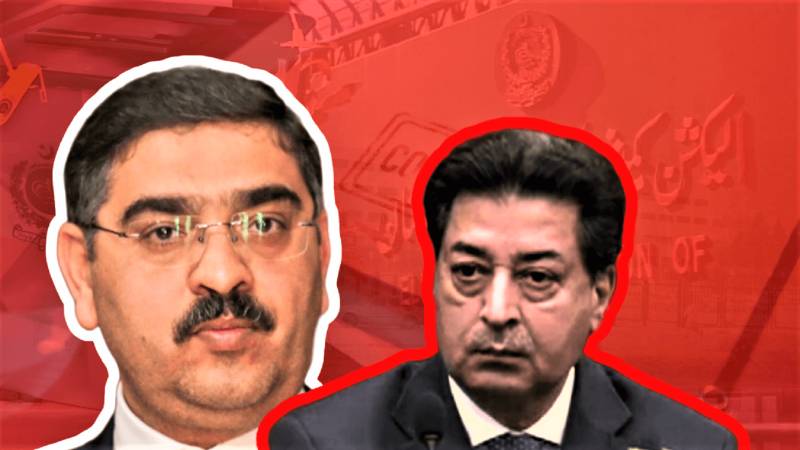
Caretaker Prime Minister Anwaarul Haq Kakar has said that fair elections are possible without former prime minister and Pakistan Tehreek-e-Insaf (PTI) Chairman Imran Khan, noting that action against politicians was being taken as per the law while he expects elections to take place as announced.
He said this in an interview with the Associated Press in New York, where he wrapped up his trip. Kakar had attended the annual United Nations General Assembly.
Asked about the general elections, Kakar said that he expects parliamentary elections to take place in the new year, 2024. He dismissed as "absolutely absurd" the possibility that the country's powerful military could manipulate the results to deny Imran's party a victory.
Kakar said that it was the Election Commission of Pakistan (ECP) which was managing the affairs of the elections and not the military.
He explained that the ECP sets the exact schedule and date for elections. And once that date is announced, Kakar said his interim government -- responsible for managing day-to-day affairs of state -- "will provide all the assistance, financial, security or other related requirements."
The interim prime minister further pointed out that Imran Khan had appointed Sikandar Sultan Raja as the Chief Election Commissioner, so "why would he (Raja) turn in any sense of the word against him (Imran)?"
He said fair elections could take place without Imran or hundreds of members of his party who remain in jail, accused of partaking or facilitating vandalism and arson against state institutions, a reference to the May 9 violence that rocked the country following Imran Khan's initial arrest in May.
Kakar added that thousands of people in Imran's party who did not engage in unlawful activities on May 9 "will be running the political process, they will be participating in the elections."
Asked whether he would recommend judges overturn Imran Khan's conviction so that he could contest elections, the prime minister said he would not interfere with decisions made by the judiciary.
But he added that the judiciary should not be used "as a tool for any political ends."
"We are not pursuing anyone (politician) on a personal vendetta," Kakar said. "But yes, we will ensure that the law is appropriate. Anyone, be it Imran Khan or any other politician who violates, in terms of their political behaviour, the laws of the country, then the restoration of the law has to be ensured. We cannot equate that with … political discrimination."
India and Kashmir
While in his speech on the floor of the UN Assembly, Kakar had expressed Islamabad's desire for good relations with all neighbours, including India, he chose to lash out at New Delhi in the interview.
He noted that India feels proud to project itself as the world's largest democracy, but it refuses to hold a democratic election or referendum in the disputed territory of Jammu and Kashmir so that its people can decide their future.
Kakar reiterated how India sent 900,000 troops to Kashmir to keep its residents in "a large imprisonment" with no political rights, in violation of the United Nations Charter's right to self-determination and the resolution calling for a UN referendum.
The interim prime minister rhetorically asked if Kashmir was located in Europe or North America, would they still curry a "callous attitude" towards resolving it.
He added that neither India nor Pakistan holds the stakes in the argument that the Kashmiri people do and that it is they who must decide their identity and, thus, future.
Afghanistan
On ties with Afghanistan and the future of the war-torn country, Kakar said they are facing some "serious security challenges".
With Pakistan sending an unannounced delegation to Kabul this week, Kakar simply said they remain in contact with Kabul.
He said that Islamabad and other leaders in the region have deliberated holding a forum to decide on incentives for Kabul and consider what changes Afghanistan's interim Taliban rulers need to make before any country takes "a huge step" and recognises their government.
The statement was a veiled reference to China, who decided this month to officially recognise Kabul after its Ambassador presented his credentials to the prime minister.

